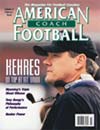AMERICAN FOOTBALL MONTHLY THE #1 RESOURCE FOR FOOTBALL COACHES
Article CategoriesAFM Magazine
|
Q And A: Larry Kehres© More from this issueQ.You graduated from Mount Union with a major in business administration. If you hadn't gotten into coaching, what do you think you'd be doing now? A.I suppose I'd be doing something in the business world. But to tell the truth, right now I can't picture myself doing anything but coaching. Q: a head coach for 14 years, are you still learning? A:Yes, of course. That's part of the changes a coach needs to make. Anticipating problems is how I'd put it. When something works, you know others will try to stop it and you need to anticipate that. You always need to be ready for a problem and the change that follows. That's exciting, when you see something new and different, and you wonder whether the opponent can stop it. Q: You haven't had a lot of coaching stops but you reflect a lot of knowled....The full article can only be seen by subscribers.
|
|
|||||||
| HOME |
MAGAZINE |
SUBSCRIBE | ONLINE COLUMNISTS | COACHING VIDEOS |
Copyright 2025, AmericanFootballMonthly.com
All Rights Reserved





